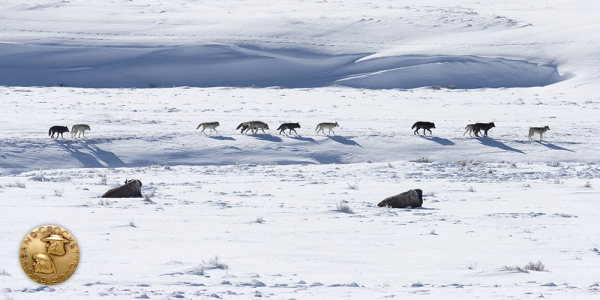Boone and Crockett Club Approves New Position Statement on Wolf and Grizzly Bear Management

The Boone and Crockett Club maintains that state and tribal wildlife agencies have the expertise and the capacity to successfully manage recovered wolves and grizzlies and refine their management policies to ensure populations remain robust and to mitigate any new challenges that arise.
The Boone and Crockett Club board of directors passed a new position statement supporting the delisting of recovered wolf and grizzly bear populations and resuming state management and oversight of the two species. The position statement was passed last week during the Club’s 136th Annual Meeting in Louisville, Kentucky. For most of its history, the Club and its members have been actively involved in wolf and grizzly bear policy, research, and developing best management practices. The Club understands the biological, sociocultural, economic, and political factors associated with managing these two species, and is well-positioned to help promote results-driven, successful conservation strategies moving forward.
“Keeping species at no risk of extinction listed under the Endangered Species Act (ESA) misuses the ESA, wastes the resources of the ESA program needed for other species, impedes conservation, and erodes support for the ESA,” the statement reads. “The Boone and Crockett Club maintains that state and tribal wildlife agencies have the expertise and the capacity to successfully manage recovered wolves and grizzlies and refine their management policies to ensure populations remain robust and to mitigate any new challenges that arise. These agencies and their associated commissions are also in the best position to address the effects on wildlife and people from wolf and grizzly conflicts.”
The B&C position statement notes that state management plans must ensure that population objectives are based on science and their means are effective and ethically acceptable to society. Most people agree that neither persecution nor wholesale protection are appropriate as the primary approaches to wolf and grizzly bear management. Still, due to the litigation that has affected management of both species (which is summarized in the situational overview of the position statement), stable governance has not been achieved as has been implemented with numerous other wildlife species under state and tribal management. Without stable management, the problems of depredation, threats to human life, property damage, and nuisance cannot be adequately addressed.
The statement continues: “State management must outperform the ESA requirement that a state management plan constitutes an ‘adequate regulatory mechanism,’ meaning that a plan gives reasonable assurances that a species will not become threatened or endangered again. The even larger challenge for state wildlife agencies is showing the entire country that a species once almost eliminated, then restored, can now be sustainably managed. State wildlife agencies have demonstrated exceptional success with many other species. Continued coordination between the states and U.S. Fish and Wildlife Service (FWS) will maintain delisted status and help withstand litigation.”
More About the Boone and Crockett Club
Founded by Theodore Roosevelt in 1887, the Boone and Crockett Club promotes guardianship and visionary management of big game and associated wildlife in North America. The Club maintains the highest standards of fair chase sportsmanship and habitat stewardship. Member accomplishments include enlarging and protecting Yellowstone and establishing Glacier and Denali national parks, founding the U.S. Forest Service, National Park Service and National Wildlife Refuge System, fostering the Pittman-Robertson and Lacey Acts, creating the Federal Duck Stamp program, and developing the cornerstones of modern game laws. The Boone and Crockett Club is headquartered in Missoula, Montana. Click here to learn more about the Boone and Crockett Club.






